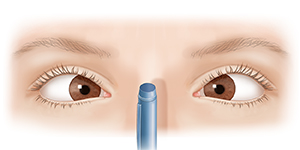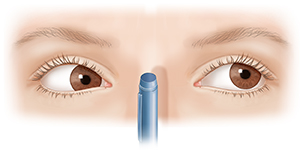Convergence insufficiency
Convergence insufficiency (CI) is a problem with the way the eye moves. It makes it hard to focus on things nearby. When the eyes converge, it means they point inward (toward the midline) to focus on something close. With CI, the eyes have trouble doing this. One eye may turn out instead of looking inward. CI can cause blurred vision, double vision, and eyestrain. You may need to close 1 eye when reading. You may be a slow reader because you have trouble focusing. These problems may go away once CI is treated. CI often starts in childhood. But it can happen in people of all ages after a brain injury, like a concussion. If you have CI, getting early treatment can help your eyes work together.
How normal vision works
With normal vision, the eyes work together to form 1 image. When you look from an object that’s far away to one that’s close, the lens inside the eye changes its shape. The hole that lets light into the eye (pupil) becomes smaller. And the eyes move slightly inward (converge). The eye and brain work together to make all these changes. The result is a single, focused image. When reading, the eyes and brain also have to do quick, complex eye movements to look across and down a page.
 |
| Normal vision. |
 |
| Convergence insufficiency. |
What causes convergence insufficiency?
Researchers aren't yet sure what causes CI. There may be problems in the complex actions that the brain and eyes do. This may be because of genes. CI tends to run in families. In some cases, a health condition can contribute to CI, such as:
If you use a computer for long periods, you may also be at greater risk for CI. Jobs that need you to use your eyes a lot may also raise your risk.
Symptoms of convergence insufficiency
You're most likely to have symptoms of CI when doing work close up, such as reading or writing. Symptoms are more likely if you’re reading or writing for a long period of time. Extreme tiredness (fatigue) also can bring on symptoms. Symptoms can include:
-
Headache
-
Double vision
-
Eye fatigue
-
Blurred vision
-
Sleepiness when reading
-
Needing to reread things several times
-
Trouble concentrating on what you’re reading
-
Losing your place in the text when reading
You may also notice that 1 of your eyes sometimes turns outward as you read. This may cause blurred vision. Or you may notice you squint or close 1 of your eyes while reading. This can make it easier to see a single, focused image. Symptoms tend to get worse during the teens and 20s. They're often steady after that.
Diagnosing convergence insufficiency
The eye care provider will ask about your past health history and do an eye exam. They will test for visual sharpness. They will also test how well your eyes converge. This is done while you look closely at something. You may do this test with each eye 1 at a time and then both eyes together.
Treatment for convergence insufficiency
CI is most often treated with special exercises. You'll be shown how to do these exercises. You may need to do them often at home. Some of these exercises are done while looking through prisms. Exercises to treat CI work well for most people. But it's important that they are done as often as prescribed by your eye care provider. Your symptoms may go away in a fairly short period of time. Computer programs can help treat CI. These can make the eyes better able to converge. They can also measure how the eyes are getting better over time.
Covering 1 eye may reduce symptoms for a short time. But it doesn't help correct CI. It also doesn't give you practice working with both eyes together, which is important to correct CI. You may need to cover 1 eye for a short time if you have a lot of reading to do. But keep in mind that it’s not a long-term solution.
In some cases, the symptoms of CI don’t go away with treatment. Your eye care provider may prescribe special prism glasses for reading. These can help you read more comfortably. In very rare cases, an eye care provider may advise surgery.